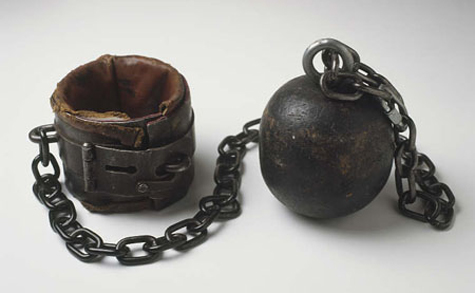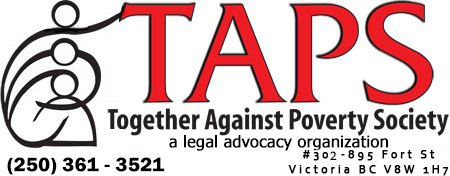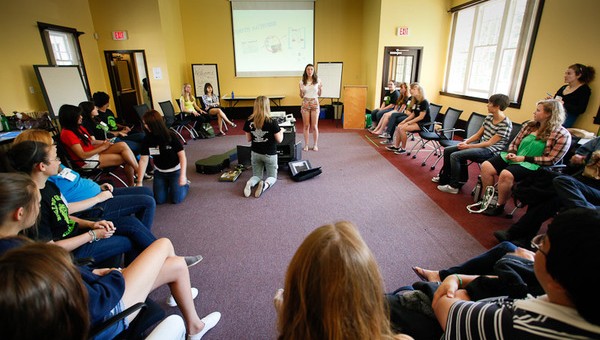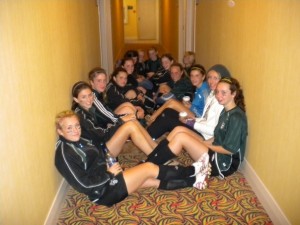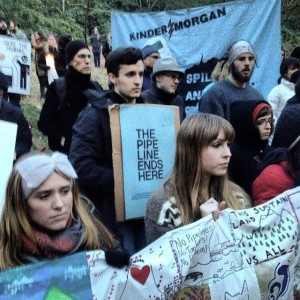Issues & Community Blog - Andrew Weaver: A Climate for Hope - Page 169
Regulation of the Debt Settlement Industry
On January 5th I sent a letter to Minister Anton seeking clarification as to whether or not legislation was going to be introduced to regulate the debt settlement industry. Similar legislation exists in other provinces (e.g. Ontario and Nova Scotia as well as in a number of US States). Below is the text of the letter. I have yet to receive a reply.
January 5th, 2015
Hon. Suzanne Anton
Minister of Justice
Room 232, Parliament Buildings
Victoria, B.C.
V8V 1X4
Dear Minister Anton:
I am writing you with regards to forthcoming legislation that would regulate the debt settlement industry.
In July of 2012, CTV news reported that the Ministry of Justice said that “In order to better protect consumers and families living in poverty, the B.C. government will provide legislative changes to regulate businesses that provide debt consolidation services and regulate advance fees paid.”
Since that time there has been little information from government about when we can expect to see this legislation.
Debt management companies prey upon some of the most vulnerable British Columbians. Rather than providing a solution to an individual’s debt issue, these companies seek to profit off the situation. A number of provinces including Ontario, Alberta and Nova Scotia have passed legislation to end these abusive practices within their jurisdictions. I think it is past time that British Columbia passes our own regulations which offer proper protection to our citizens.
Can the Minster provide me with an update as to what stage this legislation is currently at, and when we can expect it to be brought before the BC legislature?
Thank you for your time on this matter. I hope you had a wonderful holiday break with friends and family.
Sincerely,
Andrew Weaver
MLA Oak Bay-Gordon Head
Final Round of Questions Submitted to Trans Mountain
Media Statement: January 15, 2015
Andrew Weaver Submits Final Round of Questions on Trans Mountain Pipeline
For Immediate Release
Victoria B.C. – Today, Andrew Weaver, MLA for Oak Bay-Gordon Head and Deputy Leader of the B.C. Green Party, submitted nearly 100 additional question to Trans Mountain as a part of the second and final round of intervenor Information Requests in the National Energy Board hearings on Kinder Morgan’s proposed Trans Mountain oil pipeline.
The second round of Information Requests marks the final opportunity intervenors will have to test the evidence submitted by Trans Mountain in its proposal. Dr. Weaver’s questions focus on human health risks associated with the project and follow-up on his previous questions relating to the risks, impacts and response capacity associated with a potential oil spill.
“I continue to engage in this process because I believe it’s important to give a voice to my constituents and to British Columbians who worry that their concerns are being ignored,” says Andrew Weaver. “However, I remain deeply concerned that the process itself is fundamentally flawed.”
In the first round of Information Requests, Dr. Weaver submitted nearly 500 questions, while the roughly 400 intervenors collectively submitted over 10,000 questions. Over 2000 of the responses they received from Trans Mountain were officially challenged by intervenors as being inadequate. The National Energy Board (NEB) only ruled in intervenors’ favour in fewer than 5% of the instances, raising significant concerns about the integrity of the process.
“Many of the answers I received in the first round simply didn’t answer the questions I asked,” says Andrew Weaver. “The lack of substantive response from Trans Mountain and the lack of support from the NEB showed a disregard for the essential role that intervenors play in the hearings.”
Intervenors have been increasingly critical of the hearing process, noting that the absence of oral cross-examination has seriously undermined their ability to receive answers to even the most basic questions about the pipeline proposal.
In light of escalating issues with the process, Andrew Weaver continues to call on the B.C. Government to pull out of the Environmental Assessment Equivalency Agreement that it signed with the Federal Government and hold its own, independent hearing process.
“Until the B.C. government reclaims the province’s right to have its own made-in-BC hearing process, actively participating in the NEB hearings is the only way we have to properly represent British Columbians’ concerns and examine the Trans Mountain Pipeline proposal.”
Click here to see the questions submitted to the National Energy Board.
Media Contact
Mat Wright – Press Secretary, Andrew Weaver MLA
mat.wright@leg.bc.ca
1 250 216 3382
Sharing Stories: TAPS – Income Assistance Advocacy
As part of our series on poverty and homelessness we asked people to consider sharing a story about their experiences. Sharing these stories serves as a reminder that poverty and homelessness are not a choice. It’s important for us to end the stigma and stereotypes that are too often associated with these issues. Each of us has followed a different path from the past to the present. Yet some of our paths have been rockier than others.
This week we are pleased to offer the fourth of these stories. We are grateful to Together Against Poverty Society (TAPS) for providing it to us. Assisting over 5,000 people in Victoria each year, TAPS provides free, face-to-face legal advocacy for people with income assistance, disability benefits and tenancy issues.
Income Assistance Advocacy Project Case Study
Sarah is a 21 year-old woman suffering from drug addiction, Post-Traumatic Stress Disorder and Schizophrenia. Since the birth of her son this year, she began attending peer counseling sessions and has managed to stay clean with support from friends and family.
Sarah’s best friend Tom has always been hugely supportive of her and her newborn son, despite having many challenges himself. The two decided to move in together, so that they can help each other out. After 6 months living together, the Ministry launched an investigation into the nature of their relationship, ultimately determining it is “marriage-like.” Sarah and Tom are required to apply for a joint client file; otherwise, Sarah will be found ineligible for income assistance and will owe the government a large debt.
Sarah and Tom have only ever been just friends. After living through three years of homelessness together they trust each other very strongly. Although their life together is different than most roommates, they certainly would never consider themselves spouses. They do not share a bedroom, or go on dates or share finances. Despite this evidence, the Ministry defines them as living in a marriage-like relationship pursuant to the legislation.
Sarah contacts TAPS. Her advocate prepares a submission, including letters from friends, family, and psychiatrists, appealing the Ministry’s decision. Despite this, the appeal is unsuccessful. On further appeal, the Employment and Assistance Appeal Tribunal upholds the Ministry’s decision that Sarah and Tom are in a marriage-like relationship.
Recognizing the unfairness of this, Sarah’s TAPS advocate contacts a pro-bono legal organization and lays out a case for judicial review of the decision. The Tribunal and Ministry agreed to a rehearing after learning of the impending judicial review. Ultimately the decision is overturned and Sarah and Tom happily live together once more!
* A total number of 2240 clients were helped by TAPS’ Income Assistance Advocacy Project in 2014 alone.
The Daily Show Takes on Homelessness
Over the past several weeks we’ve been focusing our attention on the issue of poverty and homelessness in British Columbia. Our goal is to increase awareness and offer action items that individuals can take to support local organizations working in the area. We’re also working towards strengthening the moral, social and economic case to end homelessness in our province.
Just before Christmas, in the third of our ongoing series, I compared the cost of dealing with homelessness to the cost of not dealing with it. I pointed out that there is ample national and international research to demonstrate that substantial cost-savings occur when we move away from managing homelessness through the provision of emergency services, to actually solving homelessness through a housing-first approach. For example, a recent national report concluded that spending an extra $46 per Canadian a year on affordable housing could dramatically reduce homelessness, and in turn reduce the $7 billion per year cost of homelessness on our economy. Utah in the United States provides direct evidence to back these claims up. In 2005, Utah launched a homelessness reduction strategy after it was estimated that by housing the chronically homeless the state could save an average of $8,000 per person on costs such as emergency room visits and jail stays. As of 2014, the program has reduced chronic homelessness in Utah by 72%.
Last night The Daily Show with Jon Stewart featured a segment on Homelessness with reporter Hasan Minaj. The Utah success story was the focus of their piece. I encourage you to watch this satirical spoof and distribute it widely. It may speak directly to those swayed more by economic arguments than social or moral arguments.
Celebrating youth in our community – Liticia Gardner
This is the fifteenth in our series of stories celebrating the outstanding accomplishments of youth in our community. These inspirational young adults are enriching our lives with their passion and commitment to the betterment of society.
Liticia Gardner
 This past November hardly a day went by without the protest against Trans Mountain drilling on Burnaby Mountain making the news headlines. While many of us sat at home wondering what we could do to show our support for the Burnaby protestors, Liticia was on the front lines. Just two months earlier, upon listening to a passionate, inspirational and motivating speech on Burnaby Mountain, given by Mayor Derek Corrigan, Liticia realized that she could no longer stand by and watch from the sidelines. She had to become involved in local efforts to stop the expansion of the Trans Mountain pipeline. And so Liticia joined the SFU Activist Network on Facebook and began volunteering her time sitting vigil at the blockade that had recently been set up.
This past November hardly a day went by without the protest against Trans Mountain drilling on Burnaby Mountain making the news headlines. While many of us sat at home wondering what we could do to show our support for the Burnaby protestors, Liticia was on the front lines. Just two months earlier, upon listening to a passionate, inspirational and motivating speech on Burnaby Mountain, given by Mayor Derek Corrigan, Liticia realized that she could no longer stand by and watch from the sidelines. She had to become involved in local efforts to stop the expansion of the Trans Mountain pipeline. And so Liticia joined the SFU Activist Network on Facebook and began volunteering her time sitting vigil at the blockade that had recently been set up.
 Liticia was born in Kamloops, BC and moved to Victoria when she was eight. She attended James Bay Elementary, Central Middle School, Oak Bay High School and graduated from Reynolds Secondary where she was awarded “Top Psychology Student” in 2012. Like so many of the inspirational youth we have been featuring over the past year, Liticia was extremely active in extracurricular activities during her high school years. For example, while in Grade 12, Liticia started the Best Buddies program at Reynolds, after volunteering as a Best Buddy at Oak Bay High from 2010 to 2012.
Liticia was born in Kamloops, BC and moved to Victoria when she was eight. She attended James Bay Elementary, Central Middle School, Oak Bay High School and graduated from Reynolds Secondary where she was awarded “Top Psychology Student” in 2012. Like so many of the inspirational youth we have been featuring over the past year, Liticia was extremely active in extracurricular activities during her high school years. For example, while in Grade 12, Liticia started the Best Buddies program at Reynolds, after volunteering as a Best Buddy at Oak Bay High from 2010 to 2012.
 Some of her other activities at Oak Bay High included organizing a school wide composting program and helping to organize the annual Rubber Ducky Race in Bowker Creek with the schools’ Environment Club. In 2011, Liticia competed in the Youth Philanthropy Initiative and was part of a group of students that achieved a $5,000 grant for the Victoria Youth Clinic, a not-for-profit primary heath care service for youth aged 12 to 24 years.
Some of her other activities at Oak Bay High included organizing a school wide composting program and helping to organize the annual Rubber Ducky Race in Bowker Creek with the schools’ Environment Club. In 2011, Liticia competed in the Youth Philanthropy Initiative and was part of a group of students that achieved a $5,000 grant for the Victoria Youth Clinic, a not-for-profit primary heath care service for youth aged 12 to 24 years.
Liticia is also accomplished in soccer, which she started playing when she was 5 years old. She continues to play in intramural leagues at Simon Fraser University (SFU), where she began university this past September, having previously played competitively on the Bays United Gold Under 18 girls team and with the Lakehill Division 1 Women’s team.
In addition to soccer, Liticia is an avid scuba diver. In April 2013, she was certified with the Open Water certificate in Playa Del Carmen, Mexico while on a trip visiting Mexico, Belize and Guatemala. She immediately fell in love with diving and subsequently participated in ten dives while in Mexico, including two dives in underwater caverns (termed cenotes). Liticia was in awe with the diversity and beauty of the ocean life she witnessed during her numerous reef dives. She plans to undertake her first cold-water dive in Victoria some time this winter.
Following high school, Liticia attended Camosun College for two years. There she took university transfer courses and achieved the Dean’s List status in Winter 2013 with an A+ average. Not surprisingly, Liticia was awarded a Ken Caple College Transfer Entrance Scholarship to SFU where she is currently majoring in Gender, Sexuality and Women’s Studies, with a minor in Geography.
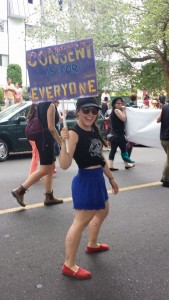 In her heart, Liticia is an activist and an advocate for a number of important social justice and environmental issues, viewing them through a lens of anti-oppression. When asked what caring about social justice meant to her, she immediately responded, “fighting for more equity as opposed to simply fighting for equality”. Liticia is outgoing and passionate and is committed to raising broader public awareness of the fact that some people inherently do not have the same access to much of what many of us take for granted. And she is not afraid to take direct action when she believes advocacy is needed.
In her heart, Liticia is an activist and an advocate for a number of important social justice and environmental issues, viewing them through a lens of anti-oppression. When asked what caring about social justice meant to her, she immediately responded, “fighting for more equity as opposed to simply fighting for equality”. Liticia is outgoing and passionate and is committed to raising broader public awareness of the fact that some people inherently do not have the same access to much of what many of us take for granted. And she is not afraid to take direct action when she believes advocacy is needed.
While at Camosun, Liticia was a member of the Psychology Club and the Women’s Centre. As a member of the University of Victoria Anti-Violence Project, she participated in 40 hours of training on sexualized violence and how to support both targets and perpetrators of violence. Currently working as a volunteer with SFU’s Women’s Centre, Liticia has been involved in the creation of “Safe(r) Places” at the university, where people can come to a safe space to openly discuss issues. She also initiated and runs a “radical mental health group” through Simon Fraser Public Interest Research Group (SFPIRG), hosting bi-weekly meetings on topics around mental health and well being.
Liticia likes to “think outside of the normal”. She cares deeply about issues related to equity, oppression and mental health. Inspired by poet Maya Angelou, whom she describes as “the most eloquent person I have ever heard”, Liticia urged us to listen to Maya recite her poem And Still I Rise. We did and we too were inspired.
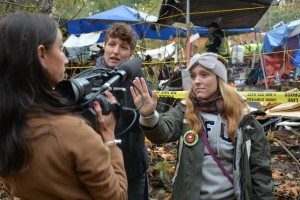 Liticia was profoundly affected by the demonstrations on Burnaby Mountain. It was a daily ritual for her to spend time at the blockade, not only reading and doing homework, but also supporting other activists by providing tea, food and access to showers. She told us that “every day was really different” on the mountain; some days were “really empowering” while others were “somber” or “depressing”. She described time when there was a general mood of hopelessness when people “felt the only thing you could do was cross the line”. Liticia was so committed to the blockade that when she learned via text that Kinder Morgan was on site and starting to drill, she “ran all the way across campus and down a muddy path” to immediately take her place at the blockade. Liticia was frequently pictured in media reports standing on the front lines of the blockade. While she saw many of her friends get arrested, she herself did not cross the police line.
Liticia was profoundly affected by the demonstrations on Burnaby Mountain. It was a daily ritual for her to spend time at the blockade, not only reading and doing homework, but also supporting other activists by providing tea, food and access to showers. She told us that “every day was really different” on the mountain; some days were “really empowering” while others were “somber” or “depressing”. She described time when there was a general mood of hopelessness when people “felt the only thing you could do was cross the line”. Liticia was so committed to the blockade that when she learned via text that Kinder Morgan was on site and starting to drill, she “ran all the way across campus and down a muddy path” to immediately take her place at the blockade. Liticia was frequently pictured in media reports standing on the front lines of the blockade. While she saw many of her friends get arrested, she herself did not cross the police line.
Liticia credits her mother with teaching her about “resiliency, hard work and perseverance”. She describes her mother as the “epitome of resiliency”. Liticia was born when her mother Alyshia was only 17 and “we went through a lot together”. Alyshia returned to school after Liticia was born, earning a nursing degree with distinction. For the past year, Liticia has helped her mother with her business Nurse Next Door, handling Human Resources for the business. We quickly recognized that Alyshia has clearly been the most influential person in Liticia’s life. But Liticia also credits Lucas Crawford, a professor in Gender Studies at SFU, as “one of the people who have put a lot of time into me”.
Committing herself to environmental issues will be a life-long pursuit for Liticia. Of this she is certain. Liticia noted that the environment is where Indigenous issues, women’s issues, as well as issues of social class and social justice all come together. Her long-term goal is to become a university professor, undertaking teaching and research in Gender Studies. And when she undoubtedly accomplishes this goal, she’ll inspire a new generation of youth to work towards the betterment of society. Of this, we are certain.

